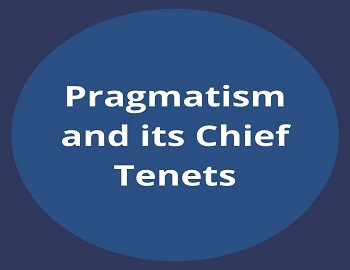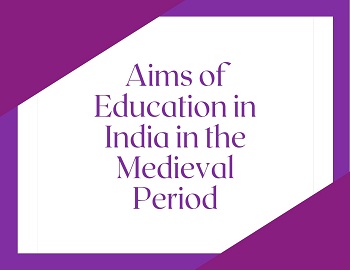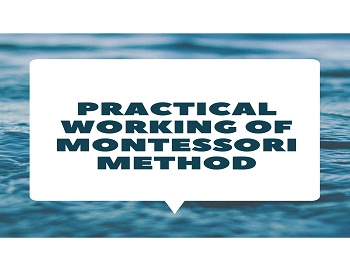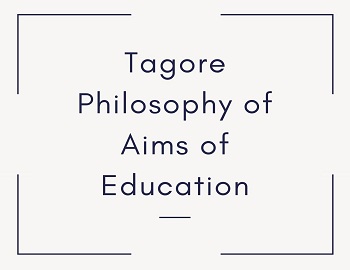Table of Contents
Pragmatism and its Chief Tenets:
What is Pragmatism?
The word ‘Pragmatism’ is derived from the Greek word ‘Pragmatics’ which means ‘Practice’. Professor Arnaud Reid gives his opinion about Pragmatism as “activity, engagement, commitment and encounter”. These are regarded as the ‘central theme’ of this school of education. Pragmatism is that school of philosophy that does not believe in idealism or naturalism. It is an American School, typical in nature and practical in approach. It criticizes idealism on one hand and on the other hand, condemns naturalism. Pragmatism does not accept the importance of ideals in life. It also ignores supernaturalism. It does not hanker after any absolute or value to be cultivated in life. This philosophy is away from spiritualism and eternalism.
Ross defined Pragmatism in the following Words:
“Pragmatism is essentially a humanistic philosophy maintaining that man creates his own values in course of activity, that reality is still in making and awaits its part of complexion from the future“.
According to Ross, “Pragmatism is merely a state in the development of a new idealism….and idealism that will do injustice to reality, reconcile the practical and spiritual values and result in a culture which is the flower of efficiency and not the negation of it”.
William James, John Dewey, Schiller and Kilpatrick are the chief exponents of this philosophy. Other equivalent names for pragmatism are ‘Instrumentalism’ and ‘Experimentalism’. Pragmatists opine that there is no established system of ideas that will be true for all times to come. All such systems are relative to the situations in which they develop and the persons they satisfy. In short, pragmatism is basically an attitude or a frame of mind and not a body of ideas. If idealism speaks of ideas and ideals, pragmatism is concerned only with facts. According to this philosophy, education contains those important practical and useful activities which make a man self-dependent and a useful member of society.
Forms of Pragmatism:
The following are the three main forms of pragmatism.
- Humanistic Pragmatism- It holds those principles and methods as true which best satisfy man’s desires and wants and promote the welfare of mankind.
- Experimental Pragmatism- This form of pragmatism conceives of the true as that which on the basis of an experiment can be verified. In other words, only observation cannot make a thing true, useful and practicable.
- Biological Pragmatism- Biological pragmatism has great faith in man’s capacity for adaptation to the environment and shaping the environment according to human needs and desires. Thus finding solutions of problems by creating a proper environment is the main essence of this philosophy.
Chief Tenets of Pragmatism:
As observed by V. R. Taneja, “Human beings are essentially active and incidentally contemplative”.
Following points may be noted in this connection:
(1) They are active in the sense that they do not want to sit idle. They are inquisitive by nature and are interested in new results. They follow the principle of ‘learning by doing’ by immersing oneself in the present situation and in the problems it presents”. According to the Pragmatistic school of philosophy pupil has to face ‘his own problem’. He thinks over them and keeps himself involved in seeking solutions to the problems. He tries to be adjusted to the new circle of his friends or fellows. The remaining way of the pupils’ adjustment is ‘with his teacher’. In this respect, he is involved in seeking and solving the problems in regard to the relationship with the teacher.
(2) The pragmatistic philosophy of education does not believe in ‘fixed principles’.
(3) ‘Verbal situations’ are not considered by a pragmatist.
(4) ‘Closed system’ and presented absolutes and origins are out of circle of this philosophy. Pragmatism does not accept abstractism. It gives emphasis to concreteness. Real facts and figures are examined and evaluated by this particular philosophy.
(5) “The growth of personality is the product to action and discovery”. This is quite clear in understanding that action is preferred more, rather than theory or thought. The mind is not static. It is dynamic and ever-changing in accordance with the action and discovery. Constructive actions are more acceptable than the blind theory of ideas and ideals.
(6) ‘No fixed or standard values’ are available in the real world. Values get themselves changed in accordance with the time and situations. These elements of time and situation are changed by the constructive actions, and these actions establish values, through temporary and situation-wise.
(7) Pragmatists lay stress on the “environment”. Naturalists also believe in environmental factors but their environment is supported by nature. Pragmatists do not find any solidarity in nature. In their view, Environment is created and is not ready-made and already existant.
(8) It is the belief on this philosophy that the thing which is helping us in the achievement of any purpose is truthful and real. The mere theory is not supported by this philosophy. The theory which is constructive and creative is accepted by Pragmatism.
(9) Judges are of the opinion that social interactions enable us to give a final touch to our personality. He says, “If it were not for his contact which other people and his sympathetic understanding of their attitude towards himself, the young human being would never achieve a personality at all. The capacity for reflection and intelligent action, ability to examine one’s needs in an objective way…..are highly elaborate products of the interaction of people”.
(10) In pragmatics philosophy, “Psychology of Man” is given priority.
(11) “Thought and Knowledge emerge from enquiry, knowledge improves as enquiring is pressed. The possibility of enquiry is the touchstone of meaning. Meaning of an idea always contains a plan of action or operation”.









Comments (No)